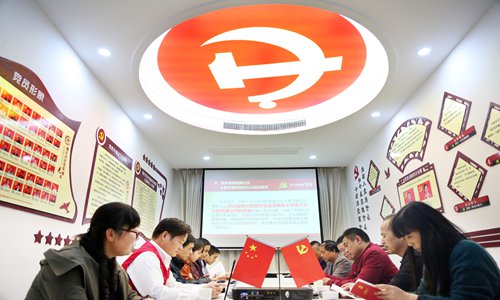
Lu Zhengrong, Party chief of the CPC branch in Yaozhuang township, Zhejiang Province, organizes members to study the new CPC Constitution. (Photo: IC)
China has released a trial regulation requiring workplaces and farmers' organizations to establish branches of the Communist Party of China (CPC) as part of efforts to consolidate the organizational foundation of the Party's long-term governance.
The regulation was reviewed by the Political Bureau of the CPC Central Committee in September and recently distributed to local governments.
The regulation states that enterprises, villages, government institutions, schools, research institutes, communities, social organizations, and other grass-roots units should establish a Party branch if they have more than three CPC members.
It also requires promoting a wider coverage of Party organizations and work. For example, it asks large-scale and cross-regional farmers' organizations, markets, commercial districts and commercial buildings to establish a Party branch.
The formulation and implementation of the regulations is very important for promoting the strict management of the Party in the grass-roots, strengthening the political function of the Party branch, and consolidating the organizational foundation of the Party's long-term governance.
"The regulation aims to help Party members find the organization whenever they switch jobs or places," Cai Zhiqiang, a professor at the Party School of the CPC Central Committee in Beijing, told the Global Times on Monday.
Establishing a Party branch in economic sectors such as workplaces or farmers' organizations is not meant to interfere in economic activities or their management structures, but to help convey and implement the central government's policies, Cai stressed.
Businesses with different types of ownership are also an important part of the socialist economy and Party members, whose stricter disciplinary requirements and advanced nature, could better help build the enterprise culture, he said.
The regulation said that Party branches in different fields, in light of actual conditions, each bear different priorities.
The Party branches of State-owned enterprises and collective enterprises shall supervise the implementation of Party and government policies, participate in the decision-making of major issues of enterprises and build corporate culture to create high performance.
Party branches in non-public economic organizations shall guide and supervise the enterprises to strictly abide by national laws and regulations, unite the staff members, safeguard the legitimate rights and interests of all parties and build an advanced culture to promote the sound development of enterprises.
In rural areas, Party branches will play an important role in uniting all resources to help local people break out of poverty, Cai noted.


